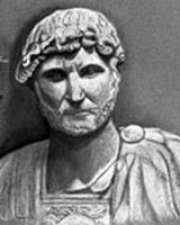|
Biografie Publilius Syrus
Scriitor latin, de origine siriană. Autor de mimi (farse), care abundau în maxime morale (sententiae) foarte apreciate atât de contemporanii săi, cât și de posteritate.
Engleză
Publilius (less correctly Publius) Syrus, a Latin writer of maxims, flourished in the 1st century BC. He was a Syrian who was brought as a slave to Italy, but by his wit and talent he won the favor of his master, who freed and educated him.
His mimes, in which he acted himself, had a great success in the provincial towns of Italy and at the games given by Caesar in 46 BC. Publilius was perhaps even more famous as an improviser, and received from Caesar himself the prize in a contest in which he vanquished all his competitors, including the celebrated Decimus Laberius.
All that remains of his works is a collection of Sentences (Sententiae), a series of moral maxims in iambic and trochaic verse. This collection must have been made at a very early date, since it was known to Aulus Gellius in the 2nd century AD. Each maxim is comprised of a single verse, and the verses are arranged in alphabetical order according to their initial letters. In the course of time the collection was interpolated with sentences drawn from other writers, especially from apocryphal writings of Seneca; the number of genuine verses is about 700. They include many pithy sayings, such as the famous "judex damnatur ubi nocens absolvitur" ("The judge is condemned when the guilty is acquitted") adopted as its motto by the Edinburgh Review.
As of 1911, the best texts of the Sentences are those of Eduard Wölfflin (1869), A. Spengel (1874), and Wilhelm Meyer (1880), with complete critical apparatus and index verborum; editions with notes by O. Friedrich (1880), R. A. H. Bickford-Smith (1895), with full bibliography; see also W. Meyer, Die Sammlungen der Spruchverse des Publilius Syrus (1877), an important work.
|





